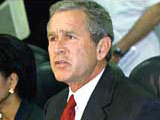|
|
TODAY.AZ / Politics
The International Herald Tribune: "Bullying Iran"
02 February 2007 [14:51] - TODAY.AZ

We have no doubt about Iran's malign intent, just as we have no doubt that Bush's serial failures in Iraq have made it far easier for Tehran to sow chaos there and spread its influence in the wider region. But more threats and posturing are unlikely to get Iran to back down. If Bush isn't careful, he could end up talking himself into another disastrous war, and if Congress is not clear in opposing him this time, he could drag the country along.
The drumbeat began during Bush's recent speech on Iraq, when he vowed to "seek out and destroy" Iranian and Syrian networks he said were arming and training anti- American forces. Bush also announced that he was sending a second aircraft carrier to the Gulf.
Hours earlier, U.S. troops raided an Iranian diplomatic office in Iraq. If anyone missed the point, aides let it be known that the president had authorized the military to kill or capture Iranian operatives in Iraq.
Iran certainly is helping arm and train Shiite militias. But the administration is certainly exaggerating the salutary effect of any cutoff as long as these militias enjoy the protection of Iraq's prime minister, Nuri Kamal al- Maliki. If Bush is genuinely worried — and he should be — he needs to be as forceful in demanding that Maliki cut ties to these groups and clear about the consequences if he refuses.
In what passes for grand strategy, the president's aides say he is betting that bloodying Iranian forces in Iraq, and raising the threat of a wider confrontation, will weaken Tehran's regional standing and force its leaders to rethink their nuclear ambitions. Never mind that Bush's last big idea — that imposing democracy on Iraq would weaken Iran's authoritarians — has had the opposite effect.
Bush seems to be grossly misreading Iran's domestic politics and ignoring his own recent experience. In a rare moment of subtlety, the Treasury Department has quietly persuaded some banks and investors to rethink their dealings with Tehran. That has made some in Iran's permanent religious elite — already worried about future oil production — express doubts about President Mahmoud Ahmadinejad's defiance of the Security Council.
As ever, the one tactic the administration is refusing to consider is diplomacy. Bush has resisted calls to convene a meeting of Iraq's neighbors to discuss ways to contain the crisis. There is no guarantee that Ahmadinejad can be persuaded that Iraq's further implosion is not in Iran's interest. But others in Tehran may have clearer heads. And any hope of driving a wedge between Iran and Syria will have to start by giving Damascus hope that there is a way in from the cold.
Bush's bullying may play well to his ever shrinking base. But his disastrous war in Iraq has done so much damage to U.S. credibility — and so strained its resources— that it no longer frightens America's enemies. The only ones really frightened are Americans and America's friends. The International Herald Tribune
URL: http://www.today.az/news/politics/35824.html
 Print version
Print version
Connect with us. Get latest news and updates.
See Also
- 31 January 2026 [01:46]
UN Geneva hosts high-level talks on protecting Caspian Sea - 30 January 2026 [13:13]
Karma and Canada - what does separatism taste like? - 30 January 2026 [12:41]
President Ilham Aliyev accepts credentials of Australia's newly appointed ambassador - 30 January 2026 [12:38]
President Ilham Aliyev accepts credentials of Norway's newly appointed ambassador - 30 January 2026 [12:15]
President Ilham Aliyev accepts credentials of Indonesia's newly appointed ambassador - 30 January 2026 [12:12]
Abramyan and the Unexpected Piano on the Garden Ring - 30 January 2026 [12:03]
President Ilham Aliyev receives credentials of newly appointed ambassador of Greece to Azerbaijan - 30 January 2026 [11:11]
Paris marks demise of "Armenian question" - 29 January 2026 [12:12]
How Russian propaganda is destroying their country - 28 January 2026 [14:08]
Pashinyan says there will be no war with Azerbaijan, pledges defensive army build-up
Most Popular
 Karma and Canada - what does separatism taste like?
Karma and Canada - what does separatism taste like?
 Ankara, Paris pledge to strengthen bilateral ties in high-level talks
Ankara, Paris pledge to strengthen bilateral ties in high-level talks
 How Russian propaganda is destroying their country
How Russian propaganda is destroying their country
 Britain seeks pragmatic China ties as US-China trade conflict grows
Britain seeks pragmatic China ties as US-China trade conflict grows
 Russia, Ukraine reach preliminary agreement to halt strikes on energy infrastructure
Russia, Ukraine reach preliminary agreement to halt strikes on energy infrastructure
 National Carpet Museum to present group exhibition
National Carpet Museum to present group exhibition
 Armenia’s pre-election debate slips back into Karabakh illusions
Armenia’s pre-election debate slips back into Karabakh illusions
